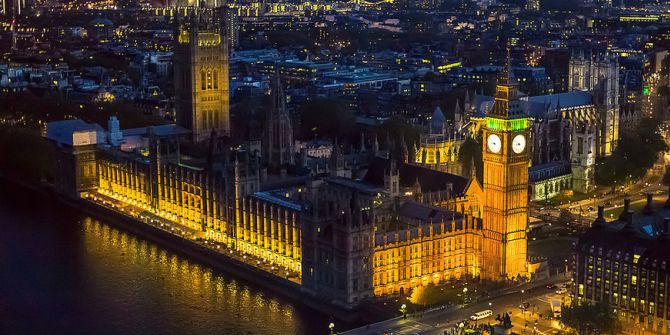In offering a summary of his new book, James Crossley considers the continued use of religious references in English politics. Tracing the history of such language over recent decades, he demonstrates how real-world events and political developments can influence how and why politicians employ religious language.

Religion and terms which carry related assumptions (e.g. Bible, Islam, Christianity, sect, martyr, etc.) are still invoked in contemporary English political discourse, even if increasingly muted. Since the 2008 financial crash there have been notable changes in the ways in which such language is constructed and to understand these changes it is helpful, as ever, to know something about what came before.
In the 1970s and 1980s Thatcher used the Bible, Christianity and Judaism to authorise and anglicise the emerging economic liberalism that we now know as neoliberalism. For Thatcher, such religious traditions prioritised charitable giving over the welfare state and promoted an associated liberalism that was deemed incompatible with the Soviet Union, Marxism and socialism. Controversial though her suggestions were, Thatcher provided the template for mainstream politicians until the emergence of Corbyn, though there were notable qualifications made. While broadly accepting the view that the Bible, and religion more broadly, formed a key source for economic liberalism, Blair and New Labour nuanced Thatcher in different ways. The most influential was that the Bible supports social liberalism, especially issues relating to equality of gender and sexuality. New Labour also helped push the older socialist understandings of socially transformative ‘apocalyptic’ Bible and Christianity to the fringes of parliamentary debate by appropriating such leftist traditions to support economic deregulation and the invasions of Afghanistan and Iraq. By the time David Cameron was Prime Minister, the Thatcher-Blair template was accepted, nuanced and intensified. Same-sex marriage was legalised (and supported with reference to Jesus in parliamentary debates), the Good Samaritan used to justify military intervention, and Jesus became the authority for outsourcing the state in the Conservatives’ doomed promotion of Big Society.
The post-2008 developments on the political right have, rightly or wrongly, become associated with Brexit, especially in relation to immigration issues. This nuanced how religion would become understood and constructed in English political discourse. For instance, to deal with UKIP and Nigel Farage, Theresa May toyed with ethnonationalist constructions of Christianity while simultaneously trying to distance herself from the far-right by employing the standard political trope of a ‘perversion of Islam’ to describe groups like ISIS. Before the 2017 General Election, and with reference to Christmas and Easter, she embraced right-wing scare stories about political correctness and the alleged threats to Christmas and Easter but most striking was her contrasting of ‘our traditions’, like Christmas, with traditions distinctive to ‘minority communities’, like Eid, Vaisakhi, and Diwali.
May’s comments played to popular perceptions of Brexit which we can see when we compare her with Cameron. Throughout his premiership, Cameron certainly made nostalgic claims about Britain being a ‘Christian country’ but the values represented by Jesus’ birth apparently explain why ‘Britain has been such a successful home to people of all faiths and none.’ ‘All faiths and none’ was a Cameron favourite, his way of explaining that the Bible and Christianity were a source of a kind of multicultural British or English nationhood. We might say that Cameron’s gentler myth of British and Christian superiority was more obviously part of the pre-Trump, pre-Brexit liberal embrace of others without mention of any problematic, illiberal Otherness typical of liberal discourses on race, religion and multiculturalism. But, in a new world of Trump and post-Referendum votes surrounding immigration seemingly up-for-grabs, May’s rhetoric was blunter in its identifying the Other and its difference.
There are other examples of May’s soft ethnonationalism in relation to Christmas and Easter and early in 2017 it looked like it was going to be electorally successful. But the nativist rhetoric was off-putting for parts of the electorate and she probably bought into stereotypes about Brexit voters too much. After the Election, May resorted back to Cameronisms and vague biblical values being ‘lived out every day in our country by people of all faiths and none’. The nativist rhetoric of Christmas and Easter past could only go so far.
Part of the reason May could not get the majority she craved was because of the pull from the Left led by Corbyn. As austerity became increasingly entrenched, the emergence of Corbynism would be accompanied by openly socialist understandings of Christianity, Jesus and the Bible in ways almost unthinkable in frontbench politics in decades before Corbyn. As party leader, Corbyn himself began referencing the Bible, including turning to the old socialist favourite passage on common ownership (Acts 4.32-35). Where Cameron in his festive messages rhetorically implied that foodbanks were a positive example of outsourcing the state, Corbyn pressed for greater state support in areas of housing and rough sleeping. When Corbyn has alluded to the Bible it has almost always been to the Parable of the Good Samaritan and the application of ‘love for your neighbour’ through the notion of not passing by on the other side, typically to defend welfare provision or social housing. In addition to implicitly critiquing much of the Labour Party just prior to his victory, there has been an anti-Thatcherite emphasis in this allusion as it runs contrary to Thatcher’s famous claim that ‘no-one would remember the Good Samaritan if he’d only had good intentions; he had money as well’.
Corbyn has invoked ‘our values’ or ‘British values’ in relation to his understanding of Christianity and the Bible. There are precise reasons behind referencing this tradition of English or British socialism. It was notable, for instance, that this tradition was employed by Corbyn amidst claims that he lacked patriotism. Corbyn, like his mentor Tony Benn, can also be located in a tradition of invoking the Bible and radical Christianity as something distinctive to the English or British Left which has historically been used to present an English or British socialism uncontaminated by continental variants deemed problematic. Related to this, it is telling that a version of the tradition has been used in light of the threat from UKIP and navigating leave and remain tendencies among Labour supporters. Through the Nativity story, Corbyn stressed dealing with both refugees and, emphatically, homelessness in England. The Corbyn team have even employed such traditions as part of a ‘radical history’ of the ‘the Peasants’ Revolt, the Tolpuddle Martyrs, the Chartists, and the suffragettes and others’ to emphasise ‘an English Labour Party’ with a ‘socialist vision’ which is a ‘patriotic one, because nothing is more patriotic than building a society for the many; not the few’.
The Liberal Democrats did not make a serious impact on the General Election but Farron can still be of use, at least analytically. Farron revealed the influence of socially liberal constraints on contemporary political discourse—particularly given his Christian background which attracts the politically divisive label, ‘evangelical’, usually code for too much illiberalism. Farron tried to focus his biblical references on immigration and Britishness and tried to skip the bits of the Bible which raise questions of homosexuality as a sin—or, more precisely, ‘homosexual sex’ to use the phrase that caught on. It is probable that he did think it a sin during his time as leader, but this is not the sort of thing a political leader of a main party can readily admit. Indeed, the Conservatives have desperately tried to mute anything like this in their alliance with the DUP.
Farron therefore made the classic liberal distinction between his personal (Christian) morality and his public political liberalism which tolerates other groups and individuals, irrespective of whether they are personally agreeable. This, for Farron, was crucial to him being both a Christian and a L/liberal. In addition to claiming that we are all sinners, to get around the problem of potential media condemnation, Farron’s approach was typical enough for mainstream political discourse: he stressed a more ‘liberal’ part of the Bible over an ‘illiberal’ part. But whereas people like Blair and Obama made similar moves to deflect from ‘illiberal’ parts of the Bible while simultaneously signalling their known opposition to slavery, homophobia, etc., Farron had to deflect from something far more problematic: an ‘illiberal’ commandment we all really knew he accepted.
The perception of an illiberal attitude towards homosexuality in relation to Christianity effectively brought about Farron’s downfall and highlighted what was considered deviation from acceptable socially liberal constructions of religion. Corbynism too was understood in the language of excessive religion, but in a notably different way. Corbynism was portrayed in the traditional media, particularly in the Guardian, in the language of ‘sect’, ‘cult’, ‘fundamentalism’, ‘puritanical’, etc. This language was repeatedly employed to denote a deviation from the assumed notion of a pure ‘church’ or ‘religion’ representing the neoliberal settlement, while occasionally ‘religion’ or ‘religious’ would also be used to denote the alleged enthusiastic irrationality of Corbynism and the sober rationality of (neo)liberal capitalism. But unlike Farron, Corbyn survived the General Election which in turn opened up space for some of the language of deviation to be dropped, modified, reapplied, or even embraced as the press struggled to come to terms with how to reconceptualise Corbynism. And that space now has involved bringing back socialist constructions of religion and Christianity but also new ones from the revolutionary left (e.g., the Bob Crow Brigade and Red London) as the shifting boundaries of ideological consent have changed how the language of religion is being perceived in mainstream English political discourse.
Cults, Martyrs and Good Samaritans: Religion in Contemporary English Political Discourse was published by Pluto Press in July 2018.
About the author
James Crossley is Professor of Bible, Society and Politics, at St Mary’s University, London, and Academic Director of the Centre for the Critical Study of Apocalyptic and Millenarian Movements (CenSAMM) for the Panacea Charitable Trust. His recent books include Cults, Martyrs and Good Samaritans (Pluto, 2018) and Harnessing Chaos: The Bible in English Political Discourse since 1968 (Bloomsbury, 2016).
Note: This piece gives the views of the author, and not the position of the LSE Religion and Global Society blog, nor of the London School of Economics.






1 Comments